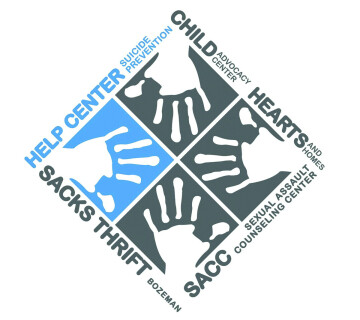Bozeman’s Mental Health Resources
Chances are you or someone you know has experienced mental health struggles. Mental health includes our emotional, psychological, and social well-being. According to the National Alliance on Mental Illness (NAMI), one in five U.S. adults experiences mental illness each year. It’s important to bring awareness to these numbers. Mental health awareness helps society work toward eliminating the stigma and shows that no one is alone. Millions of people in the U.S. are affected by mental illness every year. A huge benefit to being an advocate for mental health awareness is that it helps get resources into the hands of those who need them. I encourage you to get to know these local Bozeman resources and services. Share them with those in your life who may be struggling. Starting that conversation may save their life.

The Help Center
Provides crisis counseling, advocacy, information, outreach, support, and services to clientele in a safe, confidential environment. The intent is to assist clients in gaining insight, clarity, and empowerment. Their client-centered solutions offer effective tools in the wake of life’s difficulties and in the aftermath of traumatic events. Their phone line is open 24/7/365. Call (406) 586-3333 or visit www.bozemanhelpcenter.org
Eating Disorder Center of Montana (EDCMT)
EDCMT was founded in 2013 to meet a community and regional need for specialized treatment for food and body image disorders. Their founders saw this gap in care in southwest Montana and began building EDCMT to meet the need and to create the kind of healing, approachable environment that would truly give all patients the best chance at lifelong recovery.
Located in historic downtown Bozeman, EDCMT offers comprehensive treatment through in-person and virtual outpatient, intensive outpatient and partial hospitalization/day treatment programs. Call 406.451.7370 or visit https://edcmt.com/
Suffer Out Loud
A local nonprofit working to reduce the suicide rate in Montana. They provide mental health workshops, free printed mental health resource cards, and mental health care scholarships to cover the cost of working with a mental health care provider. Visit www.sufferoutloud.org to learn more.
Roots Family Collaborative
A local nonprofit dedicated to connecting families to the support they need, from pregnancy to parenthood. They offer support groups, programs, classes and special events, and perinatal mental health resources.Visit www.rootsfamilycollaborative.com to learn more.
Providence Mental Health
Using a unique clinical approach known as the Applied Family Systems, each client, whether an individual, a couple, or a family, receives their own clinician. The clinical team members collaborate to support people in overcoming past traumas, to lead healthier, happier, and more meaningful lives. Call (406) 579-4984 or visit https://providencemh.com/ for more information.
Gallatin Mental Health Center (GMHC)
GMHC provides integrated, individual services for mental health. Their staff includes certified social workers, skilled consulting physicians and a psychologist; certified nurses, a board-certified psychiatrist and psychiatric nurse practitioners; case managers; workers for crisis intervention, and peer support specialists. GMHC staff uses and develops a number of evidence-based patterns and methods to provide quality, well-founded support. Through full-service, consolidated efforts, staff establishes the diagnosis, ensures the health assessment, long-lasting treatment and referral for those affected by mental diseases. Call 406-556-6500.
Montana State University (MSU) Thriving Campus Directory
MSU has a partnership with Thriving Campus. This is an easy-to-use database of mental health providers in the Gallatin Valley. This is a great resource if you’re looking for a local provider to work with. Visit https://montana.thrivingcampus.com/ to search the directory.
There are also some great free national resources that everyone should be aware of:
The Crisis Text Line
Text HOME to 741741 from anywhere in the United States, anytime. The Crisis Text Line is available for any crisis. A live, trained Crisis Counselor receives the text and responds, all from their secure online platform. The volunteer Crisis Counselor will be there to help you move from a hot moment to a cool moment.
The Veterans Crisis Line
The Veterans Crisis Line serves Veterans, service members, National Guard and Reserve members, and those who support them. You don’t have to be enrolled in VA benefits or health care to connect.
Dial 988, then Press 1 or Text 838255 to access free, confidential support 24/7, 365 days a year, or visit www.veteranscrisisline.net to learn more.
988 Suicide & Crisis Lifeline
988 has been designated as the new three-digit dialing code that will route callers to the National Suicide Prevention Lifeline (now known as the 988 Suicide & Crisis Lifeline) and is now active across the United States.
Call, text, or chat 988 to be connected to trained counselors that are part of the existing Lifeline network. These trained counselors will listen, provide support, and connect callers to resources if necessary. The previous Lifeline phone number (1-800-273-8255) will always remain available to people in emotional distress or suicidal crisis.
The Trevor Project
They provide information and support to LGBTQ young people 24/7, all year round. They will listen without judgment. All of your conversations are confidential, and you can share as much or as little as you’d like. If you need support, call 1-866-488-7386, text “START” to 678-678, or visit www.thetrevorproject.org.
Online Crisis Network
If you’re struggling to pick up the phone, the Online Crisis Network is a great resource for you. Their focus is suicide intervention, prevention, awareness, and education. They provide help and hope through online crisis chat, educational on-campus and virtual college events, and awareness campaigns. Chat with someone who can help at the online Crisis Network: imalive.org.
Anyone can experience struggles with their mental health. Staying informed about local resources will help you support and offer guidance to loved ones. Knowing how to connect to an appropriate support resource can make all the difference to someone in your life.
Cassie Jackson grew up in Havre, Montana, but has called Bozeman home for the last 13 years. She is the Founder of Suffer Out Loud, a local nonprofit committed to reducing Montana suicide rates and shifting the stigma around mental health.